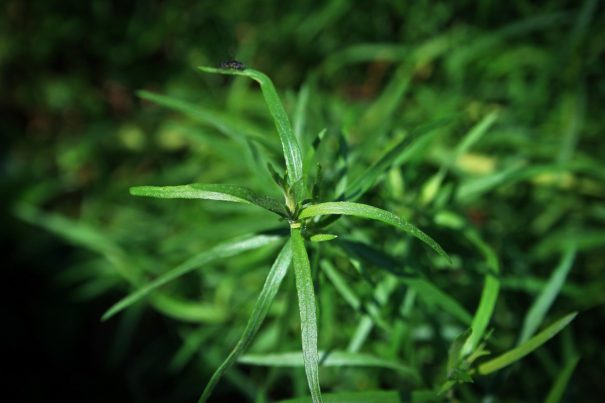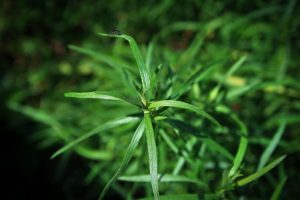
Tarragon – sources, health benefits, nutrients, uses and constituents at NaturalPedia.com
Thursday, July 06, 2017 by Jhoanna Robinson
http://www.naturalpedia.com/tarragon-sources-health-benefits-nutrients-uses-and-constituents-at-naturalpedia-com.html

French tarragon herb, which is also called dragon wort, is used for culinary and flavoring purposes, especially in Mediterranean cuisine. It comes from the family of Asteraceae, has the scientific name Artemisia dranculus sativa, is an aromatic perennial, and is rich in phytonutrients and antioxidants.

List of known nutrients
- Calcium
- Carbohydrates
- Cineol
- Copper
- Estragole
- Folates
- Iron
- Magnesium
- Manganese
- Niacin
- Ocimene
- Omega-3
- Omega-6
- Phellandrene
- Phosphorus
- Phytosterol
- Potassium
- Protein
- Pyridoxine
- Riboflavin
- Selenium
- Sodium
- Thiamin
- Vitamin A
- Vitamin B6
- Vitamin B12
- Vitamin C
- Zinc
Medicinal uses for tarragon
Tarragon has been known to contain antioxidant properties that help eliminate the harmful effects of free radicals in your body. Manganese is used as a co-factor for the antioxidant enzyme superoxide dismutase. Tarragon also helps protect against cancer.
Tarragon takes care of your oral health. Aside from helping strengthen your teeth, it can be used as a relief for sore gums that accompany aching teeth.
Tarragon does the job of commercial appetite stimulants as it can give people more zest and enthusiasm when eating meals. It was also known to give relief against flatulence, dyspepsia, and hiccups. Tarragon also gets rid of diseases that are caused by roundworms and tapeworms. It also helps repair the intestinal mucosa if it had been subjected to wear and tear, such as in the case of a diarrhea attack.
Tarragon also acts as a natural diuretic; whenever you urinate, it helps remove toxic wastes from your body and balances the water in your body. Tarragon can also act as a sedative to alleviate stress.
Tarragon is good for your heart health and it addresses cardiovascular issues. It also contains omega-3 fatty acids, which have anti-inflammatory properties.
Tarragon, especially the Russian variety, increases muscle creatine absorption. Because of this capability, tarragon allows you to do away with ingesting a huge amount of carbohydrates just to build muscle mass.
Tarragon staves off anorexic symptoms. Also, certain compounds that are found in tarragon prevent platelet activation and ahesion to the blood vessel wall, thereby preventing blood clots and plaque.
Tarragon can help protect you from getting cholera as it contains antibacterial properties that fight the onset of the disease, according to research from Ciudad Universitaria in Mexico City, Mexico.
Tarragon, which is rich in calcium and phosporus, helps ensure the proper formation of bones and helps maintain them to ensure that your bones are strong and healthy.
Vitamin A, a primary nutrient found in tarragon, makes the eyes healthy by improving visual acuity and defending them against degeneration by protecting against eye diseases like cataracts.
The vitamin B12 in tarragon protects your neurons from damage and decreases neuropathy symptoms such as numbness and tingling.
You can rest assured that you won’t have dementia when you get older if you ingest tarragon in large amounts on a regular basis, for it is rich in vitamin B6 that performs that function.
Body systems supported by tarragon
Tarragon leaves are rich in dietary fiber, which helps the nutrients in your body get evenly distributed and aids in digestion. It also addresses digestion problems such as indigestion, upset stomach, or irritable bowel syndrome.
Tarragon is also good for the immune system as it contains a lot of vitamin C.
Ways to use tarragon
Tarragon is usually added as a finishing touch to recipes to give them that final tang. For instance, the fresh or dry leaves of tarragon can be incorporated into the marinade base of lamb, fish, and poultry. It is also used to give additional flavor to traditional Christmas breads like the potica.
Being an aromatic herb, tarragon can also be used to make perfume.
Where to learn more
- Tarragon and its many surprising healthy benefits
- 7 Foods to Detox the Lungs
- 10 Highly Effective Essential Oils for Constipation
- Quick and easy guide to growing french parsley for newbies
- 5 Plants That Repel Garden Insect Pests
Summary
Tarragon has been known to contain antioxidant properties that can help eliminate the harmful effects of free radicals.
Tarragon can help protect you from getting cholera as it contains antibacterial properties that fight the onset of the disease.
Tarragon leaves are rich in dietary fiber, which helps the nutrients in your body get evenly distributed and aids in digestion.
Tarragon is also good for the immune system as it contains a lot of vitamin C.
Sources include:
Tagged Under: Tags: tarragon





